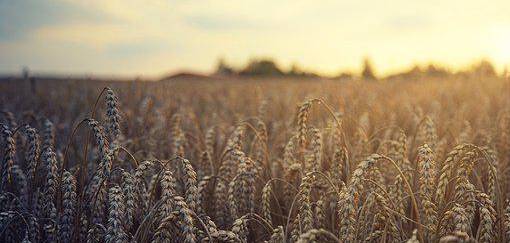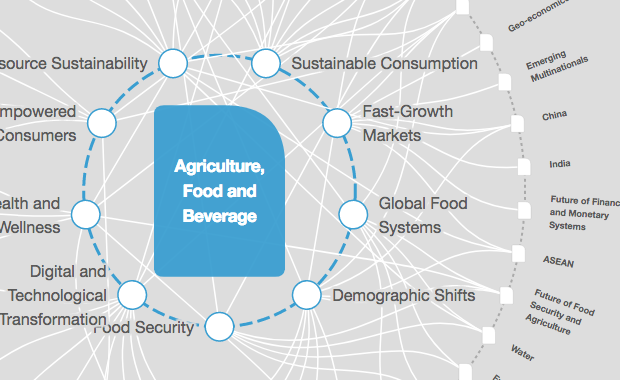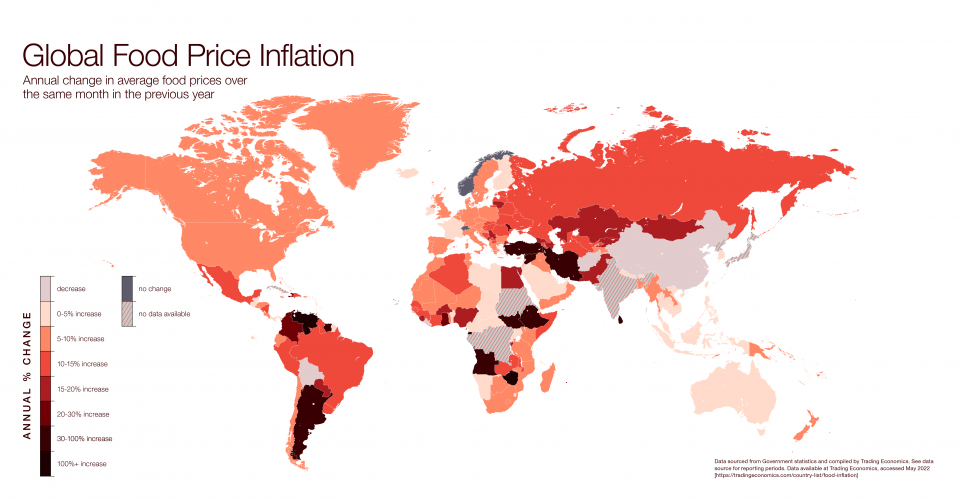
Stabilizing the global food sytem requires collaboration.
Written by :
- Ertharin Cousin - Chief Executive Officer and President, Food Systems for the Future
- Rodrigo Santos - Member of the Board of Management; President, Crop Science Division, Bayer
Agriculture, Food and Beverage

Explore the latest strategic trends, research and analysis
This article is part of the World Economic Forum Annual Meeting
- The war in Ukraine has knocked the global food system off its axis to the extent that 500 million people could face acute hunger in the next year.
- Stabilizing the global food system requires collaboration and partnerships among key players in agriculture.
- Climate resilience must be built into agriculture, including carbon-smart solutions and biological alternatives to artificial fertilizers.
The human tragedy that continues to unfold in Ukraine has been universally shocking. What has also become apparent is the suffering will be magnified as the repercussions are felt right across the global food system. Simply put, the war has knocked the global food system – already strained due to COVID-19 and climate change – off its axis. We risk a humanitarian disaster on a massive scale unless we urgently collaborate on tangible steps to address the impact head-on.
Global food system: the pitfalls and yearnings
According to Global Citizen, increased stress on food systems could lead to more than 500 million people facing acute hunger in the next year. We need to quickly, consciously and sustainably stabilize our global food system. Countries weakened by the pandemic need clear-headed partnerships between the global agriculture players, the up-and-coming innovators, governments and NGOs. More than ever, this cannot be the undertaking for one organization alone.
We must all play a role and as a global leader in agriculture, Bayer has a responsibility to act. As the impact on food supply ripples out from Ukraine, we are activating our resources and network to address three key priority areas: supporting Ukrainian farmers, stabilizing supply in the Middle East and East Africa and ensuring long-term climate adaptability.
Lagging produce
The war is hitting Ukraine’s agricultural system during the spring growing season. Ukrainian farmers are working around the clock to maintain their crops in the conflict zone but they are expected to harvest less than half of the usual 80 million tonnes of grain this year. We have donated 40,000 bags of seed to grow food on nearly 30,000 hectares. The seeds will support 1,250 small farmers in Ukraine who have difficulty accessing input for the 2022 growing season.
Sadly, this will be a drop in the ocean if the free flow of food, fuel and fertilizer out of the region is hampered. Food supply chains have already been directly disrupted in parts of the Middle East and East Africa that rely on Ukraine and Russia for grain. The UN has reported that food prices grew by 34% in the year to March, with cereal prices increasing by 37%. These impacts, acutely felt by the most fragile countries and communities, will not be solved with more barriers or export restrictions.
Crop protectionism should play no role in our world today. We continue to call for safe import corridors and more humanitarian aid. Countries must release their grain stocks on the market and support the hunger relief efforts of the UN World Food Program.
Farmers in many parts of Africa, the Middle East, and Asia struggle to maintain their outputs. Spiralling costs, fertilizer shortages and severe weather are working in concert to erode profits and reduce abilities to increase production. Nevertheless, Bayer is halfway to meeting the goal it set itself in 2019 to support the productivity of 100 million smallholders by 2030 with training, guidance and access to innovative seed and crop protection tools. And as an industry, we must inject targeted resources for smallholder farmers to support the vital role they play and dampen volatility in the global food systems.

The global food systems are facing constant inflation - Image: Bayer AG
Sustainable and resilient global food systems
Lastly, we must plan and act to ensure climate resilience in global agriculture. Farmers must grow more food, on the same fields, with fewer inputs. It is not an easy feat and it requires innovative leaps in plant science, digital technology and crop protection.
Firms like ours are already investing in these more resource-efficient, carbon-smart agricultural solutions on their own and increasingly with others. For example, short-stature corn is much better at withstanding extreme weather caused by climate change and can help to ensure the food supply for millions. We also need to focus on fertilizers, developing biological alternatives to artificial fertilizers.
Not only is artificial fertilizer responsible for 4% of global greenhouse gas emissions but its supply is heavily dependent upon Russia. We are accelerating our work and partnerships in this area. But as we look to the potential of increasing collaboration with innovative biotech pioneers, we must ensure that we communicate the positive environmental benefits that come with these innovations, working in partnership with public institutions and NGOs.
As corporate leaders, we must rise to these challenges. We must work together, work quickly and renew our focus on the long-term objective of a safe, sustainable supply of food. The global food system needs to sit right at the top of the global policy agenda. The current crisis cannot and should not be tackled alone.
Posted on 2022-05-30 11:35








Comments